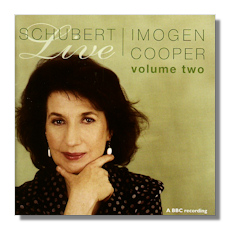
The Internet's Premier Classical Music Source
Related Links
- Schubert Reviews
- Latest Reviews
- More Reviews
-
By Composer
-
Collections
DVD & Blu-ray
Books
Concert Reviews
Articles/Interviews
Software
Audio
Search Amazon
Recommended Links
Site News
 CD Review
CD Review
Franz Schubert

Imogen Cooper, Volume 2
- Piano Sonata in C minor, D. 958
- 6 Moments Musicaux, D. 780
- 16 Deutsche Tänze, D. 783
- Piano Sonata in G Major D. 894
- 4 Impromptus, D. 935
Imogen Cooper, piano
Avie AV2157 2CDs
These two CDs form the second volume in a series of three (so far) two-CD sets. They were recorded at live recitals which Imogen Cooper gave in 2008 at London's Southbank Centre in association with the once great BBC Radio 3. Like the others in the series (the first volume is Avie AV2156), this second volume is also marketed by the British-based Avie label.
Cooper is one of the most respected and accomplished Schubertians alive today. Artur Schnabel famously said, "I play Beethoven for money; I play Schubert for love!" That seems to be akin to the degree of attachment which Cooper has with Schubert. There's a warmth, a closeness and a connection which her insights into the composer's life and works affords her. Yet without sentimentality, loss of her own personality or adulation. There's also a rigor, a discipline and a drive to Cooper's playing. At the same time as she is able to draw every last drop – or almost: reserve is also one of Cooper's virtues – of emotion from the music, we know we're in very safe hands. She has a confidence and a control that contribute to a superb consistency of technique and interpretative ownership.
Take the opening movement (the allegro) of D958 [CD.1 tr.1]. The calls to attention have a tinge of pomp, almost; of grand weight. Yet great humanity in the attack and in the tempi. This is not, though, a momentary affectation: as the movement (one of the longest on either CD) progresses, the reason for Cooper's crispness and drive becomes clear. Significantly, they're not as counterbalances to an indeterminate aura imposed from somewhere that has nothing to do with the music and make Schubert "warm and fuzzy".
Rather, it slowly becomes obvious that changes in tempo, for example, and even in dynamic between parts of the movement serve in the first place to show Schubert's conception in the round. Secondly, they convey his emotional charge, the oscillations from melancholy to elation. But, again, not as an arid exercise. Nor merely to reflect that some people are fickle that way. But to arrive at a distillation of emotional depth in the way that the composer's songs do. There is a detachment and refinement which means that these sonatas (and to just as great an extent the Moments Musicaux D780, Dances and Impromptus) are constructions of their own, not potentially derivative journal-like "outpourings". By the end of the second allegro, the fourth movement of D958, we feel not that we have followed Schubert on a journey – because he hasn't made it (yet?); but that we truly understand his itinerary. There is art (but not artifice). For another aspect of Cooper's playing is her subtlety, her use of nuance to hint and to allude. These are as powerful as is her velvet simplicity.
Imogen Cooper achieves this quite remarkable empathy (on our behalf: her playing is also very direct) with Schubert not least by making plain the variety of musical courses open to him at any one juncture in the same movement's development; and then suggesting the various emphases that make sense at the time. For example, the remarkable progression of keys through which the movement dances are emphatically not for effect. They suggest, perhaps, turmoil or effort. Cooper plays them with just enough freshness, yet with an entirely due emphasis for us to understand that they're still musical, not psychological, acts.
Nevertheless, the great strength of Cooper's interpretations is in sculpting the music in such a way that we experience it as a whole. The disparity in lengths between movements, the changes in tempo, and the experimentation with key could all fracture Schubert's musical conception in lesser hands. Cooper does more than "hold together" the edifice. She walks us through it until we cannot but experience it in its entirety. That's in part because of her great familiarity with Schubert, and with how he thought. But also because she has in her blood the many models (symphonic, liturgical, of song, sonata form, deviation from sonata form and so on) on which Schubert could and did draw.
This is popular repertoire, and well-recorded too. There are a good dozen of most of these works that could be recommended as giving a lifetime's pleasure and satisfaction – Richter on Musical Concepts 1074; Brendel on Musical Concepts 1040; Perahia on Sony 87706; Kempff on Deutsche Grammophon 463766 and Pollini on Deutsche Grammophon 419229 (reissued as DG 474613). But it's such great music that there's always room for another great interpretation. Imogen Cooper's is just that. With a close and atmospheric recording, a well-produced booklet and an attractive price, don't hesitate.
Copyright © 2010 by Mark Sealey.





















